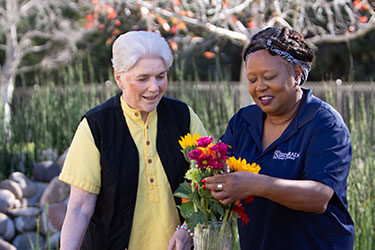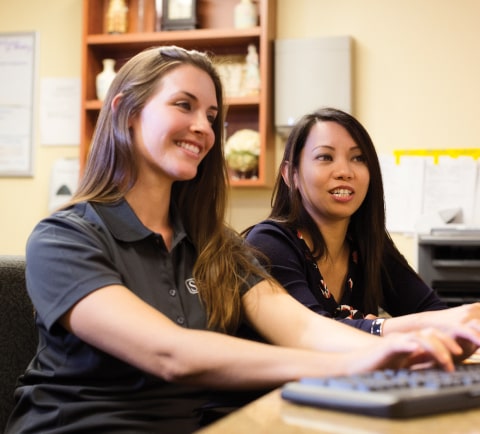COVID-19 Vaccination FAQs
Learn about the how the COVID-19 vaccine helps protect from the virus
Please note that this page is intended to provide general information and is not intended to provide guidance on medical issues. For questions or concerns about the vaccine please contact your doctor or another dedicated health professional.
We have been notified that our Residents and Associates will be prioritized for the COVID-19 vaccines, which will soon be available in the U.S. (the Moderna and Pfizer vaccines). We offer here the information we know at this time. We will continue to update you as we anticipate getting more specific information over the next two weeks.
The vaccines by Moderna and Pfizer are both mRNA (messenger RNA) vaccines. Messenger RNA vaccines give temporary instruction to our cells to make a piece of a protein that triggers an immune response. While Messenger RNA has not been explicitly used for vaccines previously, it has been studied for decades. It is currently used in targeted cancer therapies, which resulted in the technology being among the first to respond with a COVID-19 vaccine.
These vaccines do not use any weakened or inactivated virus. The two injections of COVID-19 vaccine are given in the upper arm muscle. The mRNA goes into the muscle cells, providing temporary instructions to make a part of the COVID-19 spike protein that triggers an immune response, producing antibodies to the virus just as if you’d had the infection. These antibodies protect you from getting an infection with the real virus and developing all the potential serious complications.
Frequently asked questions about the COVID-19 Vaccine
The vaccines are given in 2 doses, either 3 or 4 weeks apart. The vaccine’s side effects are minimal and temporary, primarily site redness and pain, fatigue, muscle or bone pain (and usually develop after the second dose).
The Moderna Trial had 30,000 volunteers, with 196 cases of symptomatic covid-19 developing. 185 of those were in the placebo group, and 11 of those had gotten the vaccine. Of those 196 cases, 30 people developed severe COVID disease, and one person died. All of those with severe illness and the one death occurred in the placebo group. No one who received the vaccine developed severe COVID disease or died.
The Pfizer Trial had 44,000 volunteers, with 170 of them developing COVID-19. 162 of the 170 were in the placebo group, and 8 of the 170 volunteers who developed COVID received the vaccine. 10 of the 170 participants who got COVID developed severe disease, with 9 of those 10 in the placebo group and only 1 in the vaccine group developing severe illness, and no one died.
Underlying health conditions put one at significant risk for developing severe life-threatening complications from COVID-19, including respiratory failure, pneumonia, acute respiratory distress syndrome, septic shock, stroke, heart attack, disseminated intravascular coagulation syndrome, multiple blood clots (deep vein thrombosis, pulmonary embolism), chronic fatigue, acute liver failure, acute cardiac injury, and death.
These vaccines have been shown to reduce the risk of developing COVID-19 and significantly reduce the risk of developing severe COVID-19 disease and its complications. Their side effects are transitory and include injection site redness and pain, fatigue, and muscle or bone pain.
Currently, the numbers of COVID-19 cases in the U.S. are rising rapidly, with over 2500 Americans now dying daily. That is two Americans dying every minute of every day from Covid-19. Those numbers make it urgent to get vaccinated as soon as possible.
The name “Operation Warp Speed” does make it sound as if the vaccine trials were rushed. But this was political marketing hype and does not reflect how vaccines are developed by health organizations and medical research centers worldwide. Remember, many vaccines may come to market over the next year. The first two that will be available in the U.S. (Pfizer and Moderna) are mRNA vaccines and work in the same way. These mRNA vaccines use technology that has been around for decades and is not new. These two vaccines have gone through the same clinical trial phases that annual flu vaccines go through.
Your genetic code is in your DNA. These messenger RNA instructions direct your muscle cells (and only those at the vaccination site) to make part of a spike protein to trick your body into developing antibodies and immune response. It does not go into your DNA.
References:


